It’s such a cute little sound, isn’t it? Little face and nose scrunching up and then “pffft,” a little sneeze. The majority of the time, it is nothing to be concerned about, and more than likely, it is just something in the air. We all sneeze; dogs sneeze too, so why shouldn’t cats sneeze?
When cats investigate their new environments, like canines, they sniff. They breathe in dust, hair and other minute particles into their little nasal passages. Sometimes these little particles cause minor irritations or simply tickle her nose and cause the cat to sneeze. It is a natural reaction for most living beings; proof that your little friend’s respiratory system is fully functioning.
It is normal that your cat lets out a sneeze occasionally; however, if your cat starts sneezing frequently and you notice mucus, blood or a discharge from her eyes, it is an indication that something more serious may be happening with your cat’s health. It could be something as simple as a common irritant to something more serious that needs immediate attention.
Main Reasons Why Cats Sneeze
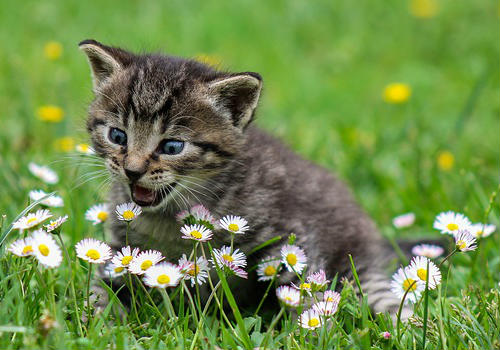
Cats may sneeze simply due to some unexpected excitement or sudden movements that cause them to take a fast breath. Usually, it’s as simple as that or if a bit of dust, lint or hair tickles her nose.
[amazon bestseller=”cats Feline Nose Relief”]
However, there are more reasons that you should be aware of, especially if your cat sneezes frequently.
Common Household Irritants
The same things that may cause you to sneeze may irritate your little friend’s nose too:
- Certain cooking spices like pepper
- Vinegar
- Bleach
- Common cleaning products
Cigarette Smoke
If you notice your cat frequently sneezes when you smoke, it is probably a good idea to restrict your smoking to the outdoors so your kitty will not sneeze as much. Second-hand smoke is not only harmful to humans; it may also have serious adverse reactions for your pets.
Foreign Irritants
If your cat goes outside, something as benign as a small blade of grass or pollen may lodge in her nasal passage as she is breathing. We know pollen makes many humans sneeze, especially during allergy season. Cats are not immune to pollen either.
If the irritant does not dispel with the sneeze, the sneezing may continue and you should call your veterinarian.
The Common Cold
“There’s no cure for the common cold” is an old adage that also holds true for felines. If your kitty simply has a few sneezes, runny nose, and watery eyes, she might just have a cold, especially during cold and flu season. As long as she continues to eat, drink and be merry, the symptoms should go away without any treatment.
However, if you notice your cat seems to have lost her appetite and is not drinking as much water, it may be an indication of something more serious, meaning it is time for a visit to the doctor before she dehydrates or her condition worsens.
Respiratory or Viral Infections
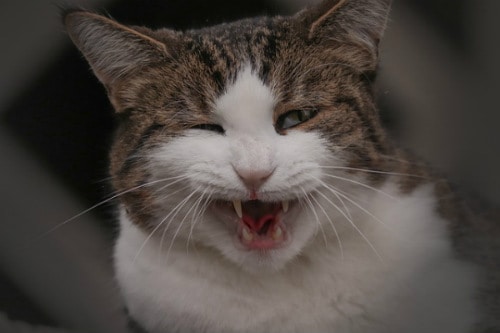
Cats rarely have allergies that manifest in excessive sneezing. Instead, this is usually a sign of an infection. Your vet can tell you if your cat has any upper respiratory ailments, often determined by more than occasional sneezing.
Cats can also get viral infections like cat flu, rabies, ringworm, toxoplasmosis or even herpes. One symptom of these infections is sneezing.
Reaction to Intranasal Vaccine
If you and your cat recently visited the vet for her vaccination against upper respiratory infections, she may sneeze for a few days after as a reaction. If the sneezing continues beyond a few days and you notice any other symptoms, it is best to contact the vet for a followup.
Dental Problems
If you have an older cat and her sneezes include any nasal discharge, it could be a sign of a dental disease caused by an infection in her teeth. Like humans, older cats may also experience gum disease or tooth abscesses.
The infection’s bacteria can travel from the infected tooth to your cat’s nasal cavity and induce sneezing. If left untreated, these infections may be harmful to your cat’s overall health.
Frequent, Ongoing Sneezing
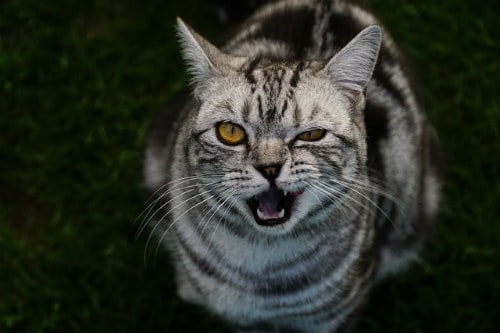
If your cat experiences frequent, continual sneezing, it may indicate something more serious is going on.
Cat Flu or Influenza
Humans are not the only species susceptible to getting cold and flu. Felines can contract these illnesses as well. If you notice your cat with more serious symptoms than simply sneezing, call your vet right away. A few of these symptoms include:
- Coughing
- Loss of appetite
- Runny eyes and nose
- Lethargy
- Fever
- Difficulty breathing
[amazon bestseller=”cat flu”]
Exposure to Essential Oils Toxic to Felines
While some essential oils may make a human sneeze, they may be far more dangerous to your feline friend. Simply inhaling some essential oils may be extremely toxic to a cat’s liver.
The feline liver does not have the most essential enzymes necessary to metabolize certain essential oil compounds. Even inhaling the scents may cause seizures or worse, fatal liver diseases in cats.
The most toxic essential oils to cats and obviously the ones to keep out of a home if felines are present are:
- Peppermint and wintergreen oils
- Lemon and other citrus oils
- Eucalyptus oil
- Pine and sweet birch oils
- Cinnamon and clove oils
- Pennyroyal oil
- Tea tree or melaleuca oil
- Ylang ylang oil
While you may find these particular oils calming and aromatic, they may be deadly to your little furry friends. It’s best to go through your essential oil stock and toss out any of the toxic oils before bringing a cat into your home.
Common Household Plants Toxic to Cats
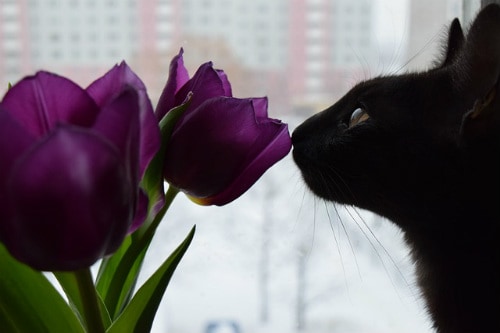
Like essential oils, many common household plants are toxic and pose serious risks if your cat is exposed to them. Plant toxicity may cause damage to a feline’s kidneys or heart, which may be fatal.
If you have any of these plants growing outdoors, you will want to keep your cat indoors, so she is not exposed to them. This is just a short list of the most common plant and flower species that you should be aware of:
- Azaleas and Rhododendrons
- Chrysanthemum, Daisy, Mum
- Daffodils, Narcissus
- English Ivy
- Hyacinth
- Lily of the Valley
- Oleander
- Marijuana
- Tulips
Additional symptoms beyond sneezing that may indicate feline toxicity include difficulty breathing and swallowing, vomiting and diarrhea. If you notice your cat drinks and urinates almost constantly, it could be an indication of infected kidneys due to toxicity.
Feline Leukemia
The most dangerous cause of cat sneezing is feline leukemia, which weakens the feline immune system, making your cat even more susceptible to developing asthma or contracting cat flu.
If you notice additional symptoms beyond those for cat flu, take your cat to a vet for a comprehensive checkup as soon as possible.
Feline Bacterial Infections that are Harmful to Humans Too
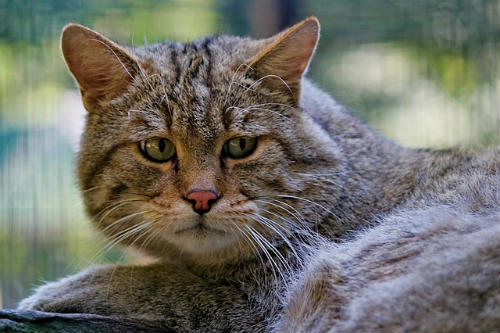
You can actually pick up some serious diseases from a sick and untreated cat. Infections known to pass on to humans include fungal infections like ringworm or intestinal infections like roundworm.
Toxoplasmosis is a serious infection that can threaten human pregnancies if transmitted by your cat.
Cat-Scratch Fever
Catchy Ted Nugent song from back the 70s, but bartonellosis is a very serious infectious disease. When left undiagnosed and untreated in felines, it is potentially fatal to humans if transmitted.
If you have a sick cat, be careful not to let your cat scratch or bite you, especially if you have not had her to the vet.
A Healthy Cat is a Happy Cat
If your vet clears your cat of any infections or diseases, there are some things you can do around your home to ease your cat’s sneezing:
- Clean your house! Beyond the normal everyday cleaning, do a thorough “spring cleaning” to eliminate or minimize dust particles or any other irritating particles from the air.
- Change your cat’s litter box. If your cat is prone to sneezing, it may be her litter. Low-dust kitty litter is best to keep the dust particles to a minimum. It may not clump as well as other litter, but it will make your cat happier.
- Humidify your home with a vaporizer to alleviate your kitty’s dry nasal passages. You can also boil a pot of water or leave a hot shower running to create some steam.
- If you can do it, use some saline nasal drops to moisturize her nasal passages.
[amazon bestseller=”cat sneezing medicine”]
Keeping your little friend healthy and happy will keep you healthy and happy. You never want to see your pet in any pain or discomfort. If your cat has more than sneezing going on, it is important to make an appointment with your veterinarian for a comprehensive checkup. Do not try to diagnose the symptoms on your own if she is doing more than just the occasional sneeze.
"In ancient times cats were worshipped as gods; they have not forgotten this."
-- Terry Pratchett

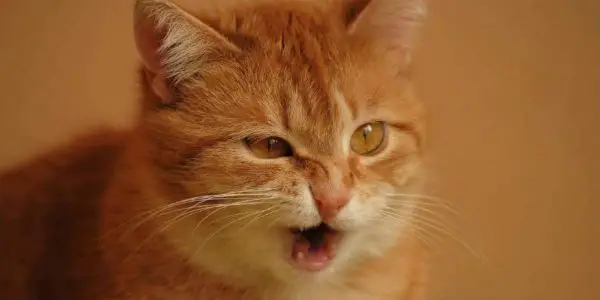
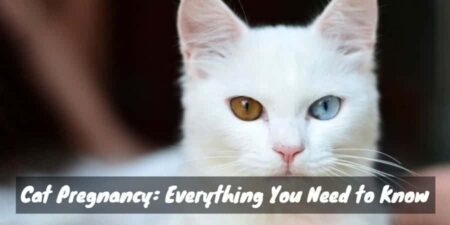
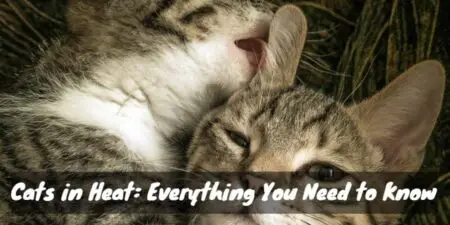
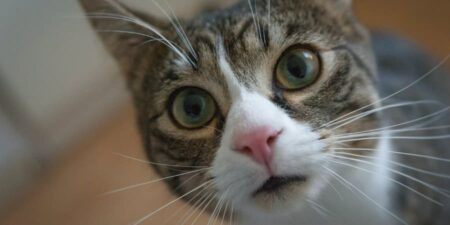
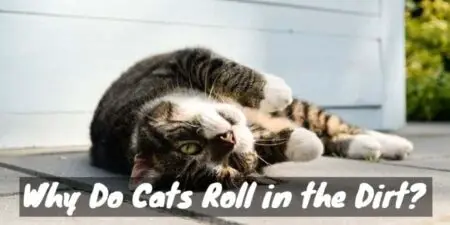
There’s nothing funnier than a sneezing cat. They’re so cute when they do it.